THE RETURN OF THESEUS
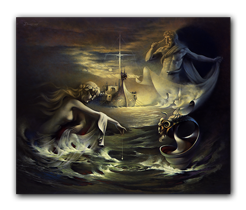
Chance, the Grand Magister of Order, gathered the obvert elements from the chronicles of time and fashioned from them the master Chessman, he who administers the ancient rites of Poetic Justice.
Every nine years King Aegeus was obliged to send seven young men and seven young maids to be devoured by the Cretan Minotaur who lived in the Labyrinth, which was built for King Minos by Daedelus. The event occasioned a royal feast, which preceeded the fourteen hapless young victims being ceremoniously ushered one by one into the maze, there to be greeted by loud bellowing before being trapped and devoured by the half man - half bull, in full gaze of the cheering crowd.
The time had come when once again the flower of Athenian youth must be selected for the fateful mission, and this time Theseus, the son of Aegeus was chosen to be part of the royal ransom. Theseus bade his father farewell, but not before assuring him that he would slay the Minotaur and secure the freedom of his companions to rejoin their ship for home. Furthermore, he promised his father he would sport white sails as a victory sign for the homeward journey, instead of the customary black funeral ones.
As luck would have it, the Fates decreed that Minos' daughter Ariadne should fall in love with Theseus, and in return for a promise of marriage she gave him the magic ball of thread which Daedalus had given her before he escaped with his son Icarus from the wrath of Minos. The magic thread, when tied by one end to the door of the Labyrinth, would roll itself through the maze to the centre court where the monster slept. Ariadne then revealed the best secret of all, and Theseus now knew the hour of the night when slumber rendered the Minotaur dead to the world.
Needless to say, by cock-crow next day the monster was slain and the fourteen escaped with Ariadne and were ship-bound, stopping at Naxos for re-victualling. That lovely isle, however, proved to be the hub that spun a spoke; the gods were surely affronted when Theseus broke his pledge to Ariadne and pulled anchor for home without her.
The young Athenians celebrated their victory with free flowing wine for the rest of the
journey and Theseus, midst his rejoicing, forgot to haul up the white sails as he
approached the shores. King Aegeus looked for the victory signal in vain; overcome
with grief for his favourite son he jumped into the sea and drowned.
- DANIEL
A tragedy with many undertones not fully elucidated by Daniel's narration. The subtext
is apparently in the myth of Dionysos and Ariadne, the woman who the only truly faithful
god chooses for eternity. However before this immortal union can occur, Ariadne must
go through deep suffering. Thus the Cretan princess, daughter of King Minos, wakes on
a lonely beach on Naxos to discover that Theseus has abandoned her, even though she
had saved him from the Minotaur. What Daniel leaves out in this story is that Ariadne
was already Dionysos' beloved before she betrayed him.
- LJO
HOME |
LEWIS J. OBI MD, FSRA |
SERENDIPITOUS JOURNEY |
CONTACT
ABOUT DANIEL |
DANIEL GALLERY |
CATALOG RAISONNE |
DANIEL LITHOGRAPHS
The Daniel Gallery | Copyright © 2012 ObiArts, Inc. | All rights reserved
Web Site Design, Web Hosting & Search Engine Optimization by BoomClient
![]()








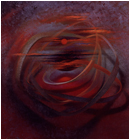




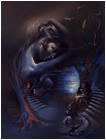










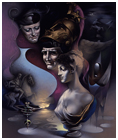

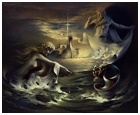




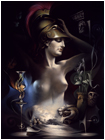
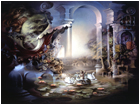



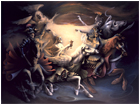

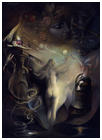
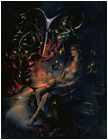
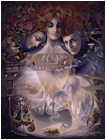

 VISIT US ON FACEBOOK
VISIT US ON FACEBOOK